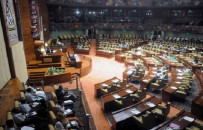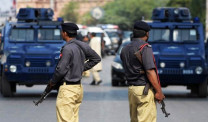Bypassing blessings for a mechanised existence
IIUI screened ‘Baraka’ on the second day of its conference on globalisation.

Opening with the shot of a snow monkey ‘meditating’ on a hot spring day on the snow mountains of Japan, its natural habitat, the director of Baraka (blessing) takes the viewer to the beginning of time to show what mankind has been missing out on while trying to make life more mechanised.
The two-hour long movie, without a voice over and commentary, was a visual depiction on the philosophy of life. Though the film is open for interpretation, it highlights the horrors that mechanisation of human life has created and how oblivious mankind is to the situation. The camera glides through different continents to present the contrast between the beauty man is bent on destroying in the name of development.
The movie was screened at the International Islamic University Islamabad to an audience of students and faculty in the second session of an international conference on “Globalisation and its impact on Indigenous Cultures” here on Friday.
The movie delighted the viewers right from the opening shot; the snow monkey sits deep in thought with his eyes closed, as if he has shut himself from the world around him and is trying to forget a bad memory.
The scene then changes to a cinematic structure that involved slow motions, use of music, collages, time lapses in photography and powerful images. The camera zooms into the world that man is busy building at the expense of distancing himself from nature; an increasing number of people being forced to live amid trash due to heavy mechanisation, the innocent being mass murdered with modern weaponry were some of the examples pointed out.
“This was not how man was supposed to live his life,” commented Dr Ejaz Akram of IIUI while reviewing the movie for the audience. He explained to the audience that according to one translation Baraka means grace, therefore implying how man has turned away from grace in his mad quest for development fuelled by the globalisation phenomenon.
Dr Tugrul Keskin from Turkey said that the process of privatisation under IMF & World Bank programmes started under the globalisation agenda in 1984 to 1988 in Turkey. Following this the Islamic movement parties also followed a free market policy. “It strengthened education system in Turkey and brought freedom of speech and respect for human rights,” he added.
Dr Nazarul Islam, dean of social sciences at IIUI, while discussing Bangladesh’s experience with globalisation said that the negative impact on Bangladesh may be linked to the international policy formation. “More than 25,000 non-formal schools are operated in Bangladesh by the NGOs, which is a huge success of globalisation,” said Islam.
Published in The Express Tribune, November 19th, 2011.



















COMMENTS
Comments are moderated and generally will be posted if they are on-topic and not abusive.
For more information, please see our Comments FAQ